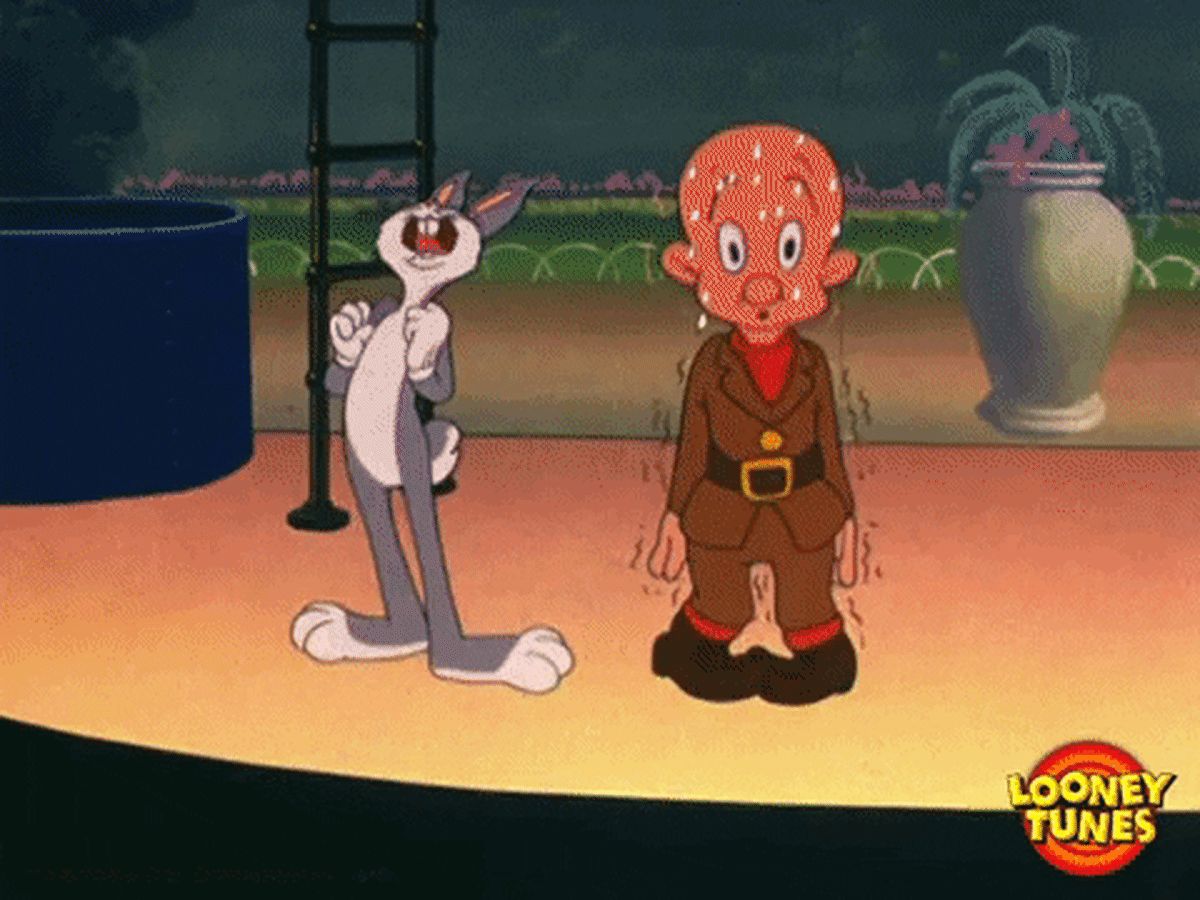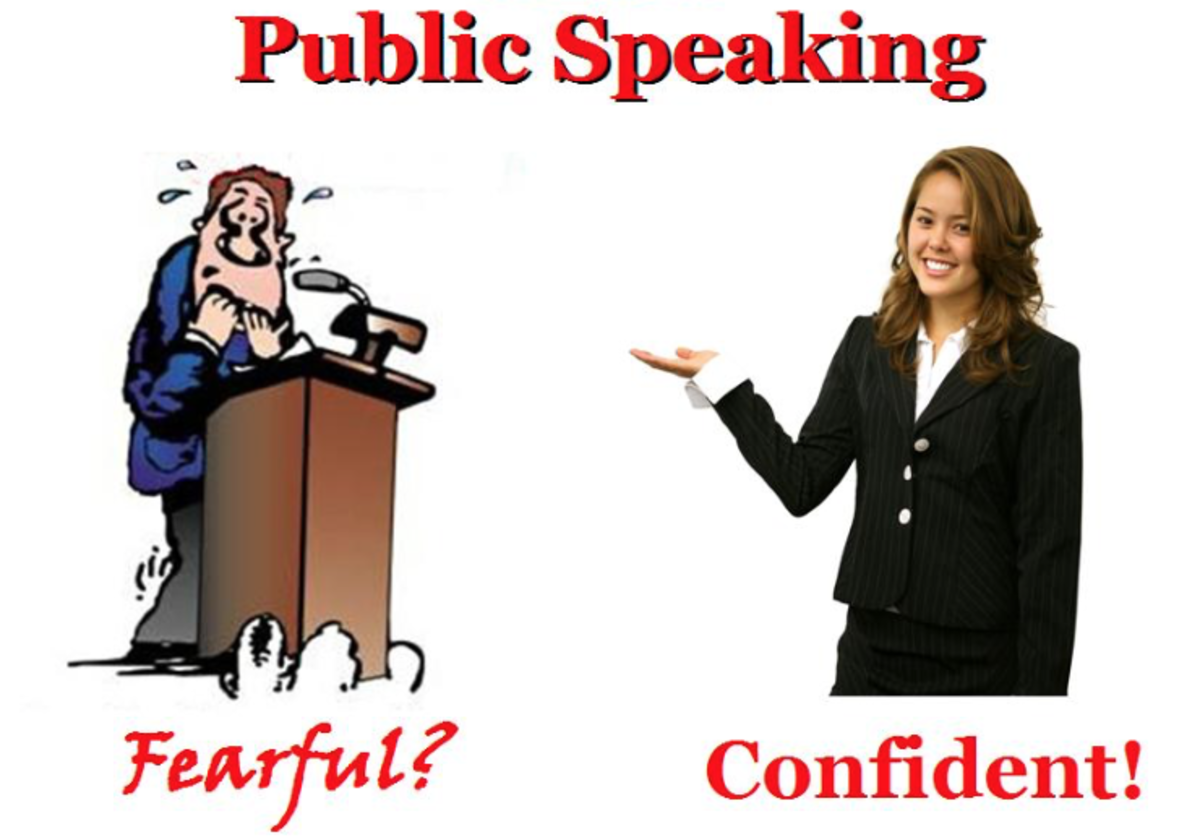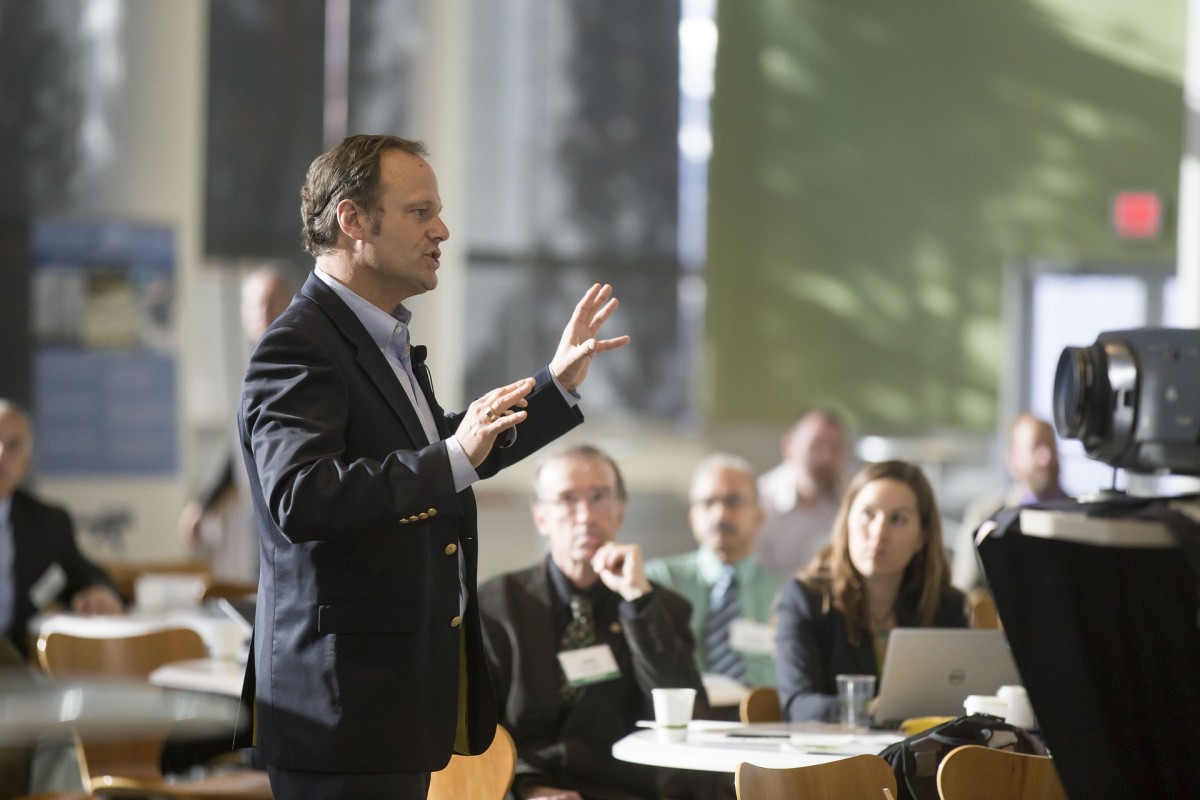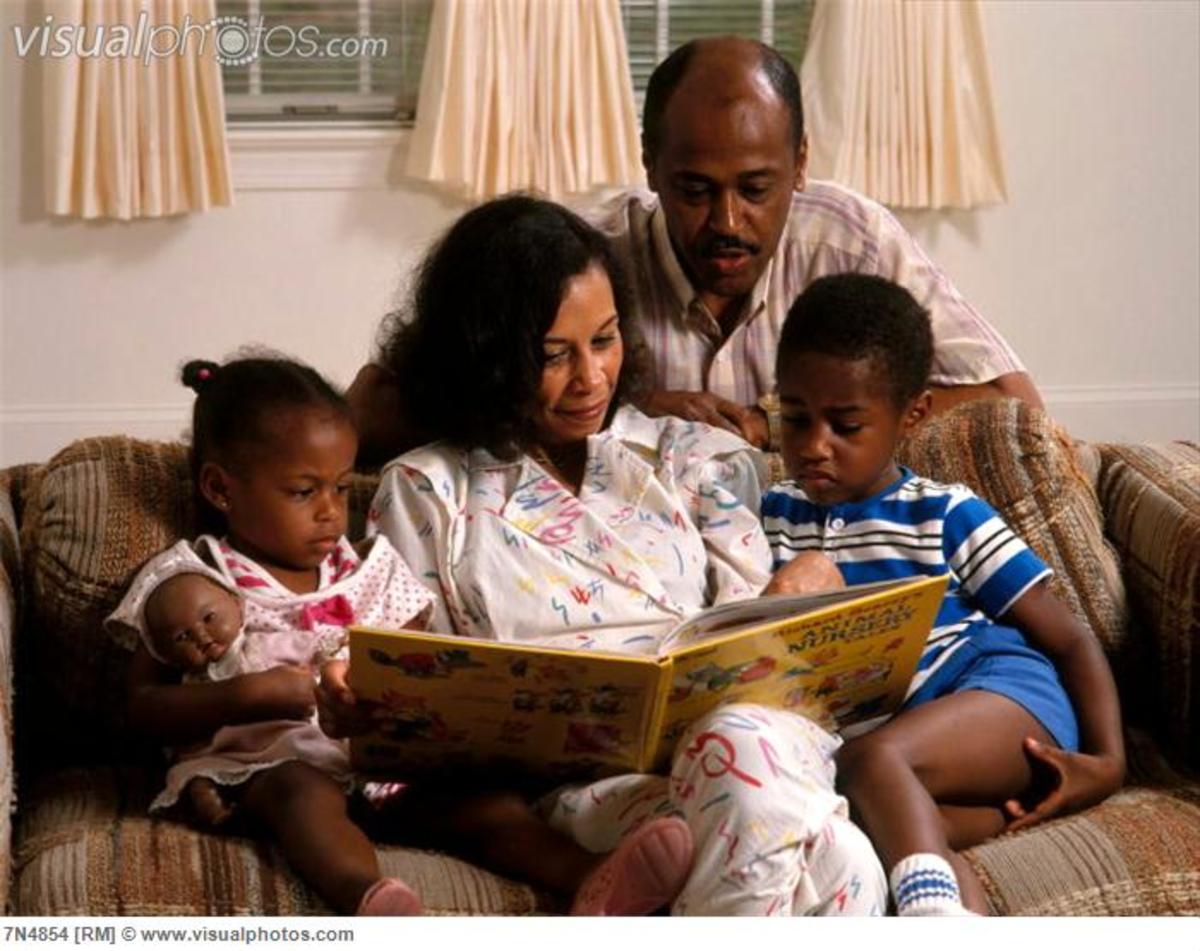How to Beat Your Fear of Public Speaking
My first speech class
I didn't have a speech class until my senior year of high school. I honestly don't know if that is typical or not. Given how the world has tilted towards people who can communicate clearly, I would hope we start earlier today.
I'm not sure if my fear of speaking in front of a group was the typical fear, or tied to a speech problem in my younger days. I had to go to speech therapy for a while as a young child. Perhaps I was still apprehensive about my speech. Perhaps it was just the normal fear of standing in front of a group of people. For whatever reason, it was terrifying.
The first speech I can remember giving in that class was a pre-written speech about onions. For this speech we had to choose from pre-written works. We were supposed to focus on the delivery of the words, and not on figuring out what to say. I clearly recall yawning at one point during my speech, and then ad-libbing "If that's how I feel giving this speech, I can only imagine how you feel listening to it."
I was not off to a great start. But this class, and a few more similar classes in community college taught me my first important lesson.
There's no substitute for practice
Public speaking is in many ways like any other skill. You get better with practice. The more you take advantage of opportunities to speak in front of a group, the better you'll get. I do believe that some people have natural gifts for it, and others have natural obstacles to it, but to some extent everyone can get better through practice.

To get better at public speaking
There's no substitute for practice
Public speaking would be required for my career
I eventually chose a career that would require a ton of public speaking... working as a youth pastor in a local church. I wouldn't just get in front of people to speak, I would get in front of teenagers. Teenagers who weren't required to learn what I had to say in order to pass a class. Some who wanted to be there. Many who didn't.
But if you're reading this, there's a good chance you've realized public speaking would be a greater requirement in your career too. Maybe you're part of a group presenting your findings to a larger group. Perhaps you need to make a proposal to a boss or supervisor. Maybe you find yourself simply struggling to explain your point of view to your coworkers in collaborative settings.
The ability to communicate clearly in corporate settings is required for all sorts of careers. So how do we get better at it?
Step One: Read
What I recommend you read
If you want to stay away from religious sources, I recommend "Made to Stick" by Chip and Dan Heath. https://www.amazon.com/Made-Stick-Ideas-Survive-Others/dp/1400064287
In this book, the Heaths examined some of the most successful corporate messaging and drew conclusions about what made some messages "stick" while other's didn't. Chapters with focuses on things like "simple" "concrete" "unexpected" and "emotional" can give you a sense of what to expect from their findings. These are principles of communication that cut across context and form. If you apply them in your setting, you'll find that people hear and remember what you had to say.
Regardless of your religious perspective, you may have noticed that megachurch pastors tend to be some of the slickest communicators around. If you're willing to learn from them, I recommend "Communicating for a Change" by Andy Stanley. https://www.amazon.com/Communicating-Change-Irresistible-Communication-Resources/dp/1590525140
Where the former book teaches how to make sure messages are remembered, Stanley's book focuses on helping your audience apply your message. He takes a practical view towards helping people live and do things differently as a result of your communication. The big ideas from this book have shaped my public speaking more than any other. Ideas like
- Have ONE point. Don't give your audience 20 things to remember. Give them one thing to remember. Address that one point from every possible angle and include how everyone in the room will need to interact with that one point. Whenever possible, keep to one point, and save your other points for a different message/speech/meeting
- Create a map to your destination. Show your audience how to get from where they are to where they need to go. This is where some messages will look like they have multiple points - but they are arranged as steps from point A to point Z. Its about a single map, rather than several disparate points.
- Internalize your message. In my contexts I would tell people that I prefer to be "conversational, not presentational" in my style. In the book Stanley talks about not needing notes to have a conversation with your friend. You knew the subject of your conversation well enough to have that conversation without having to refer to your notes! While I regularly had notes when I engaged in public speaking, I sought to know my information well enough that I could have a conversation with my audience about it.
- This means you memorize concepts, not words. When you are communicating, you communicate what you know about each concept before moving to the next concept. Stanley suggests that anyone can memorize 5 concepts
If I write anymore here, you might not take step one and read!
Step One
| Read
| Great communicators love writing about their process
|
Step Two
| Prepare
| Figure out your process through trial and error
|
Step Three
| Feedback
| Equip other people to give you feedback
|
The steps aren't rocket science, but executing them still matters
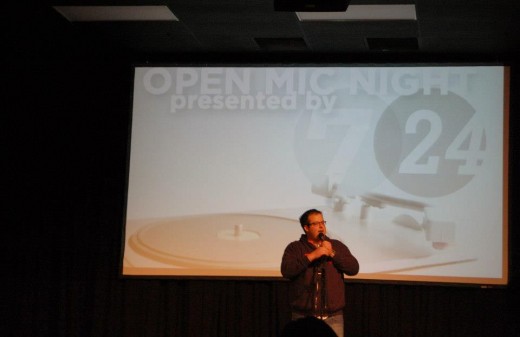
Step Two: Prepare
What are you going to say and how are you going to say it?
I break my preparation of a message up into two parts.
1. WHAT am I going to say?
and
2. HOW am I going to say it?
I could make this a lot more complicated, but the simple truth is that most inexperienced communicators could solve their problem just by thinking about step 2. They've figured out what they need to say at the meeting, or what the content of their presentation is, but spent no time working on HOW they're going to say it.
WHAT you're going to say is the CONTENT of your message. If you need to do research, this is the step that includes research. If you need to clarify points, this is the step for writing out the words of your message. I find writing out manuscripts helps me clarify what my message is. I rarely read from a manuscript in front of a group, and the exact words in my message will be different, but writing it ahead of time helps me clarify WHAT I want to say. This step ensures that I am not improvising the bulk of my communication, or even worse, winging it.
But figuring out WHAT to say is only half the battle. In my experience, it is sometimes less than half. Andy Stanley, who I cited above, relates it to having a difficult conversation you need to have with a spouse. You likely wouldn't read a list of demands if you wanted that conversation to go well. Instead, you might clean up the house, prepare a nice dinner, and get the mood just right, and even then you would be very careful in HOW you communicated your message.
The effort you put into HOW you communicate your message is directly related to how much you CARE that your audience hears and responds to your message.
The HOW can include mechanical things like
- Where will I stand or sit to deliver this message? Will I move around the room or stage or stay in one place?
- Is this message best delivered in a one-way format where I talk and my audience listens, or can I communicate this message another way? (Working groups, interactions, etc)
- HOW can I make sure this message sticks? Are there stories I can tell that will illustrate the point of this message and help it be remembered? Can I surprise my audience with something unexpected?
I regularly spend more time working on HOW I will give a message than I spend working on WHAT my message is. For good or for bad, that's the process that has worked for me.
As you read what great communicators have written about their preparation, figure out what your preparation will be, and then do the work to prepare!

Step Three: Feedback
After the communication
I can't tell you how much I hate this last step. Even after regular public speaking for the better part of a decade, I'd still rather give my messages and then never think about them again. Inviting others to give me feedback is still intimidating.
And its still essential.
I remember the first time I saw video of myself giving a message. It was from one of those college speech classes. As I thought back to giving that speech, I imagined myself as lively and interactive. As I looked at the video, I saw a person in danger of falling asleep at any moment. It was only through a formal system of feedback that I learned that I need to turn my energy "up to eleven" in a public speaking context.
If you're committed to having one point that your audience needs to learn, understand, and use in their life, then the best way to know if you've accomplished your goal is to ask a trusted person in your audience to tell you afterwards what they think your one point was and what they are going to do with it. If they can't do that, it speaks to your messaging.
If you want your message to stick, find a way to see if a plurality of your audience can summarize your material a week after your presentation. If you want to get really risky, find a way to see if they've applied your message to any area of their life in the past week. This moves public speaking beyond the criteria of "people enjoyed listening" and into "people's lives were benefited." Depending on your context, one of those bars might be more appropriate than the other.
Informal feedback can be helpful, but my experience suggests you won't get honest helpful feedback without setting up a formal feedback system. The seminars I've led with informal feedback generally stopped at "thanks for the info, that was helpful!" But when I had feedback cards and asked specific questions, I was able to update my material and better serve my audiences.
Following the first two steps in this article will help you feel more confident going into public speaking. Following this step will help take you from good to really good, or even great!
What is your biggest fear about public speaking?
Some Miscellaneous Freebies
These are thoughts that didn't really fit anywhere else
- Rehearse! But only if you want it to be good. Even if you aren't trying to memorize the exact words (Like I wasn't) you will likely have some key phrases that you want to say exactly the way you want to say them. I have found that just saying the words out loud a few times helps train my mouth and my brain to do the same in front of an audience. Rehearsing in the same physical location as your public speaking when possible helps with blocking too (where you'll stand, walk, sit, etc).
- Engage more senses if you can. Powerpoint can be a crutch (raise your hand if you've sat through people who read their powerpoint to you, and didn't do much else). Powerpoint can also be a way to engage both eyes and ears and brains in a way that simply talking doesn't. Giving people handouts can engage textile senses too. I might write a whole other article about learning styles, but this is a first step to engaging different learning styles too.
- Study communicators in other fields to round out your knowledge base. I find it fascinating to learn about how stand-up comics hone their craft. I've learned from the books of business leaders about how they lead and communicate in business. I've watched videos of public speaking in tons of different contexts. As you've learned from me by now you know I've learned from pastors and church leaders about communicating in those settings too. Part of the fun of last years presidential race was seeing how they communicate their message to their audience. (Trump's ability to make his message "Stick" might be another article)
- My comfort with public speaking is still tied to my relationship with my audience. When I speak to a brand new audience, I often get just as nervous as when I was still starting out. The more I know my audience PERSONALLY, the better I feel in my preparation. Short of that, the more I know ABOUT my audience, the better my chances of preparing well. When I have an opportunity to speak to a new audience, I try to do my homework whenever possible to learn about that audience before I speak to them. For many, their comfort in public speaking is tied to how well they know their material. I'm presuming you know your material extremely well at this point. I'm adding the relationship with the audience as another factor to think about.

